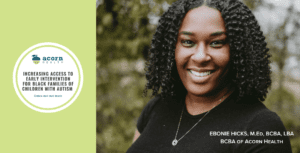Clinically reviewed by Ebonie Hicks, M.Ed, BCBA, LBA. BCBA of Acorn Health

Increasing Access to Early Intervention for Black Families of Children with Autism
This Black History Month, Acorn Health honors the individuals who have paved the way to better understanding the disparities in care that Black families of children with autism are facing. We are committed, each and every day, to providing access to early intervention for all families in the communities we serve.
According to the CDC, 1 in 68 Black children have autism. But that statistic doesn’t tell the whole story. While incidence of autism in Black communities may be similar to that of white communities, the time in which Black children receive care has been shown to be delayed. Research shows that Black and Hispanic children have been historically diagnosed at later ages and oftentimes gain access to fewer resources than white children. Today, we are seeing that gap closing, but there is still a lot of work to be done.
Some studies have shown that Black children typically experience a delay of up to three years to receive an autism diagnosis from the time symptoms first appear. A 2019 study showed that autism rates of Black and Hispanic children rose 40% since 2014, an increase likely due in part to greater access to intervention. Black children historically have received intervention later than is recommended.
What Are the Barriers to Care?
There are many reasons to consider this delay in receiving a diagnosis and treatment. For one, there can be a lack of understanding of autism itself in many Black communities. It may be less common for Black families to know other families who have received an autism diagnosis. So when they begin to suspect their child is experiencing developmental delays, they may not know from where or when to seek help.
Once an autism diagnosis is received, families may have difficulty gaining access to care because their traditional work hours are not compatible with therapy schedules. Other Black families may have distrust of the medical community because of past historical events.
Benefits of Early Intervention
“Parents of Black children should know that help is available and that early intervention is key,” says Ebonie Hicks, a BCBA at Acorn Health.
“It provides the best possible outcome for your child when you reach out for support as soon as a diagnosis is received. I’d also tell parents to find support. I’ve seen that in Black communities, there is generally less awareness and understanding of what it means to have a child with autism and how to support them. Finding other families, whether online or in your community, that you can talk with and share experiences with, will be extremely helpful.”
Resources
There are more resources available for both Black families and Black professionals working in the ABA field. Specifically, Black Applied Behavior Analysts is an organization with a mission to promote, educate, empower, and disseminate Applied Behavior Analysis (ABA) within the black community. For families, Autism in Black is an organization that aims to reduce the stigma associated with autism in the Black community while also providing advocacy and education resources. The Color of Autism Foundation helps to connect families of color to one another to provide support and resources throughout their journey.
Do you have questions about your own child and if ABA therapy could help? Reach out to Acorn Health at 844-244-1818 or https://acornhealth.com/admissions to inquire about receiving services for your child.
We believe early intervention is the key to your child reaching their highest potential, and we are here to support you!